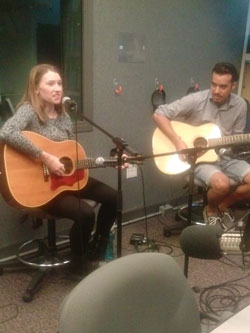Fat Talk Free Week is a body image awareness campaign that has been launched in universities nationwide since 2008. The University will promote our first Fat Talk Free Week this October 16 to 22.
The campaign’s premise is that our conversations have a relationship with our body image, and in many cases these conversations negatively impact the way we view ourselves. Fat Talk has become a customary form of communication. Lines like, “I wish I looked like…” or “I hate my hips” are so commonplace that they are a form of everyday small talk.
Fat talk gives women the opportunity to create solidarity among friends. If she demeans her body image, it appears that she does not put her self-image above those of her friends. It creates a sense of equality and common ground. Similarly, compliments based on appearance add to the negativity of fat talk. Women become fascinated by their physical appearance as a form of acceptance and positive feedback, rather than their intellect or behavior.
Lisa Bloom, author of “Think: Straight Talk for Women to Stay Smart in a Dumbed Down World,” has explained that this phenomenon starts early for women. A woman’s fascination with her physical appearance is one that society encourages her to accept from an early age. The way we talk to young girls, such as complimenting them on how cute they are or forgetting ignoring conversations with substantial topics, encourages young women to foster this preoccupation with their physical appearance.
In 2011, ABC News reported that almost half of all girls between three and six years old are concerned that they are fat. Research has indicated that this preoccupation with body image negatively impacts a woman’s self-worth, confidence levels, and self-satisfaction. It is within the structures of society, the conversations that we carry and the mindsets that we hold, that this feminine ideal continues to harm the health of women.
That being said, these insecurities are hardly limited to women, as negative body image can certainly impact the health and livelihood of men. In fact, the results of a 2006 survey show that 46 percent of men and women would rather give up a year of their life than be fat.
For the University, this story has become clear in Women’s Health classes over the past years. Dr. Andrea Hope, Assistant Professor of Health Studies, asks her students to write about their personal experiences with their body image. Similar to the national statistics that have been publicized, the responses on our campus were astounding.
The experiences with students that Dr. Hope has had prompted her to make our campus community involved ad aware of this epidemic of body image dissatisfaction and eating disorders Fat Talk Free Week is our first campaign to encourage University faculty, staff, and students to change conversation.
Whether it is a quick coffee run or a dinner table conversation, we encourage you to take the focus away from the aesthetic and turn it towards your mind. This week, we challenge you to change your conversations and eliminate fat talk!
In order to help you do so, we have organized a series of events that recognize the mind, body, and spirit. For the mind, blog access will begin on October 16th, and it will allow you to post your experiences with body image awareness anonymously. On October 18 at 5:30 p.m., a free Zumba class in Bolan Gym will promote the healthy, fit body. On October 19 at 2:30 p.m., a free yoga class will be offered on the South Side of Boylan Gym for the spirit.
There is no experience required for either of the class. Just wear comfortable clothes and bring your student ID. If you have a yoga mat, bring it along as well. Throughout the week, student volunteers will be tabling around campus and in the dorms to raise awareness and help you get involved with the campaign.
The week’s events are supported by Dr. Hope’s Grant-In-Aid for Creativity with help from individual students, Counseling and Psychological Services, the Gender Studies Program, Delta Phi Epsilon sorority, The School of Nursing and Health Studies, and Eta Sigma Gamma.



